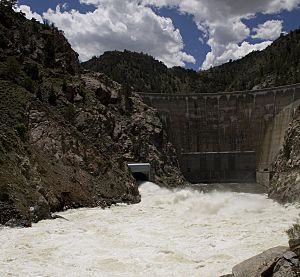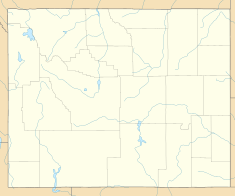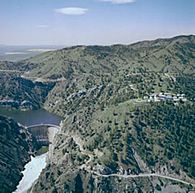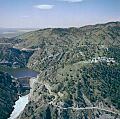Seminoe Dam facts for kids
Quick facts for kids Seminoe Dam |
|
|---|---|

Spillways full open following heavy snowmelt, June 2011
|
|
|
Location of Seminoe Dam in Wyoming
|
|
| Country | United States |
| Location | Carbon County, Wyoming |
| Coordinates | 42°09′21″N 106°54′30″W / 42.15583°N 106.90833°W |
| Status | In use |
| Construction began | 1936 |
| Opening date | 1939 |
| Owner(s) | U.S. Bureau of Reclamation |
| Dam and spillways | |
| Type of dam | Concrete thick gravity-arch |
| Impounds | North Platte River |
| Height | 295 ft (90 m) |
| Length | 530 ft (160 m) |
| Width (crest) | 15 ft (4.6 m) |
| Width (base) | 85 ft (26 m) |
| Dam volume | 210,000 cu yd (160,000 m3) |
| Spillways | 1 |
| Spillway type | Gated concrete tunnel |
| Spillway capacity | 48,500 cu ft/s (1,370 m3/s) |
| Reservoir | |
| Creates | Seminoe Reservoir |
| Total capacity | 1,017,279 acre⋅ft (1.254795×109 m3) |
| Catchment area | 7,210 sq mi (18,700 km2) |
| Surface area | 20,291 acres (8,211 ha) |
| Maximum water depth | 206 ft (63 m) |
| Power station | |
| Hydraulic head | 166 ft (51 m) |
| Turbines | 3x 15 MW |
| Installed capacity | 45 MW |
| Annual generation | 96,406,970 KWh (2007) |
The Seminoe Dam is a large concrete dam built on the North Platte River in Wyoming, United States. This dam helps store water for farms and creates electricity. It is owned and managed by the U.S. Bureau of Reclamation, a government agency.
Seminoe Dam is the highest dam on the North Platte River. It sits just upstream from the Kortes Dam. You can find it in a narrow, quiet canyon. This canyon was carved by the North Platte River as it flows through the Seminoe Mountains. The dam is about 40 miles (64 km) northeast of Rawlins.
The dam is 295-foot (90 m) tall. It creates a huge lake called Seminoe Reservoir. When the reservoir is full, it covers more than 20,000 acres (8,100 ha) of land. Seminoe State Park is right next to the reservoir. A small town called Seminoe Dam is also nearby. This town is home to the people who work at the dam and manage the park.
Contents
Building the Seminoe Dam
The idea for Seminoe Dam first came up in the 1930s. It was part of a bigger plan called the Kendrick Project. This project aimed to control the flow of the North Platte River. The goal was to help farms in the valleys around Casper, Wyoming.
Why the Dam Was Needed
The project was first called the Casper-Alcova Project. It was approved on June 16, 1933. This happened during the Great Depression, a time when many people needed jobs. The project helped create jobs and improve farming. Later, on August 9, 1937, the project was renamed the Kendrick Project. This was to honor John B. Kendrick, a politician from Wyoming.
How the Dam Was Built
In 1934, a company called Winston Brothers Company and its partners won the job to build Seminoe Dam. Work started on February 20, 1936. The first steps involved blasting rock and digging out the site.
The tunnel that would redirect the North Platte River was finished on January 17, 1937. Sadly, one person died during this part of the work. By May of that year, a temporary dam, called a cofferdam, was built. It was tall enough to send the river into the new tunnel.
Workers began pouring concrete for the dam on January 19, 1938. The very last bucket of concrete was poured on December 21, 1938. Water began to fill the reservoir on April 2, 1939, when the outlet tunnels were closed. The dam's power station was completed, and the whole project was ready to go on August 3, 1939.
During the construction, two people died, and several others were seriously hurt. Also, there were two active fault lines (cracks in the Earth's crust) that ran through the canyon near the dam site. Workers had to dig these out and fill them in to make the dam safe.
Helping Farms Grow
When the dam was first finished, it helped provide water to only about 600 acres (240 ha) of farmland. But over time, it helped more and more. By 1980, it was supplying water to 22,581 acres (9,138 ha) of farmland in the Casper valley.
Fun Activities at Seminoe Reservoir
The Seminoe Reservoir is a great place for outdoor fun! The Wyoming Game and Fish Commission stocks the reservoir with fish. This means there are plenty of fish for people to catch.
You can also go boating and fishing on the reservoir. However, getting to the shoreline can sometimes be tricky. This is because the area is not very developed and is far from big cities. It's a quiet spot for those who love nature.
Images for kids
 | Janet Taylor Pickett |
 | Synthia Saint James |
 | Howardena Pindell |
 | Faith Ringgold |




